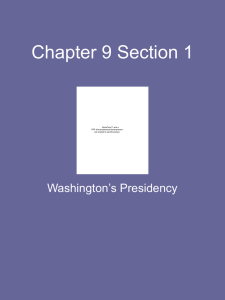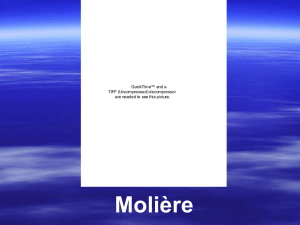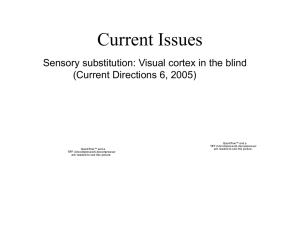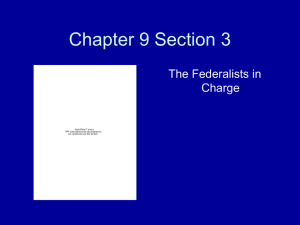Document
advertisement
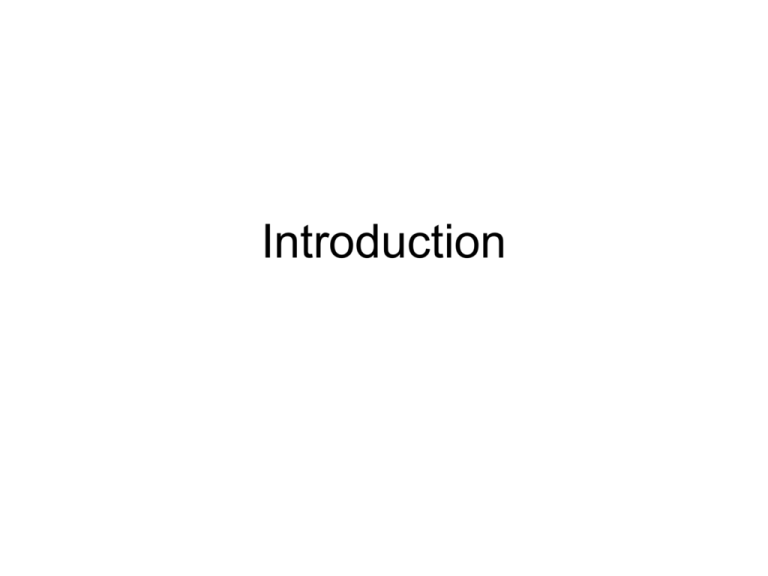
Introduction Nature • What is Nature? – Untainted by human beings? Separate from human beings? • Should it be conserved, preserved, or neither? • Why should it be conserved, preserved, etc.? – Aesthetic, Prudential, Moral • Where did the idea of Nature come from? – Judeo-Christian picture, Native American picture, Americans interested in distancing themselves from Europe, urban yuppie backbackers These questions matter… • Should a marine preserve be implemented off the coast of Encinitas? • Should Glen Canyon have been dammed? • Should old-growth redwood forests be protected? • How bad is global warming? • What should be done to land after huge fires? • Should huge fires (in areas where humans won’t get hurt) be left alone? QuickTime™ and a TIFF (Uncompressed) decompressor are needed to see this picture. Conservation v Preservation • Conservationists are committed to the notion that we should make wise use of environmental resources. • Preservationists are committed to the idea that we should preserve the natural environment, or at least significant portions of it. • Historically, the dispute centers on the use of federal lands. (In the 12 western states, 52% of the land is owned by the federal govt.) • The historical solution has been zoning public lands for either preservationist or conservationist purposes. But conflicts arise b/c of changing patterns of use., e.g., changing economies, animals not knowing the zones. • Preservationist Legislation – – – – – – – – – – Wilderness Act, 1964 Wild and Scenic Rivers Act, 1968 National Trails Systems Act, 1968 Wild Horse and Burro Act, 1971 ESA, 1973 Eastern Wilderness Act, 1975 Federal Land Policy Man Act, 1976 Endangered American Wilderness Act, 1978, Public Rangelands Improvement Act, 1978 Alaskan National Interest Lands Conservation Act, 1980 Wilderness Act 1964 • DEFINITION OF WILDERNESS • (c) A wilderness, in contrast with those areas where man and his own works dominate the landscape, is hereby recognized as an area where the earth and its community of life are untrammeled by man, where man himself is a visitor who does not remain. An area of wilderness is further defined to mean in this chapter an area of undeveloped Federal land retaining its primeval character and influence, without permanent improvements or human habitation, which is protected and managed so as to preserve its natural conditions and which (1) generally appears to have been affected primarily by the forces of nature, with the imprint of man's work substantially unnoticeable; (2) has outstanding opportunities for solitude or a primitive and unconfined type of recreation; (3) has at least five thousand acres of land or is of sufficient size as to make practicable its preservation and use in an unimpaired condition; and (4) may also contain ecological, geological, or other features of scientific, educational, scenic, or historical value. The Idea of Wilderness How did it originate and change? The Western History of Wilderness in a Nutshell • • • • • • • Judeo-Christian. Puritan/Calvinist Old World Romanticism Thoreau/Emerson Muir Leopold The Contemporary Idea Judeo-Christian • Adam and Eve were banished to the “accursed” wilderness that will “grow thorns and thistles for you and none but wild plants for you to eat” • Moses and his people wander the wilderness for 40 yrs until reaching Promised Land • Jesus goes into the wilderness for 40 days and is tempted by Satan • Wilderness as environment of hardship and evil (still, there is a current of thought whereby spiritual catharsis could happen)… "...The English word paradise derives from the Old Persian pairidaeza, which means 'walled enclosure, pleasure park, garden'. This term entered Hebrew, Aramaic, and Greek while still retaining its original meanings." ハ ハハハハ- An Encyclopedia of Archetypal Symbolism QuickTime™ and a TIFF (Uncompressed) decompressor are needed to see this picture. Paradise QuickTime™ and a TIFF (Unc ompressed) decompres sor are needed to see this picture. QuickTime™ and a TIFF (Uncompressed) decompressor are needed to see this picture. QuickTime™ and a TIFF (Uncompressed) decompressor are needed to see this picture. QuickTime™ and a TIFF (Uncompressed) decompressor are needed to see this picture. QuickTime™ and a TIFF (Uncompressed) decompressor are needed to see this picture. Puritan/Frontier View QuickT ime ™an d a TIFF ( Uncomp res sed) deco mpre ssor ar e need ed to see this pictur e. William Bradford, one of the US pilgrims, saw nothing “but a hideous and desolate wilderness, full of wild beasts and wild men”; the Puritan John Cotton understood nature as “a wild field where all manner of unclean and wild beasts live and feed.” • Roger Williams: “the Wildernesse is a clear resemblance of the world, where greedie and furious men persecute and devoure the harmlesse and innocent as the wilde beasts pursue and devoure the Hinds and Roes” • Timothy Dwight, Yale’s president, lamented in 1821 that as the pioneer pushed further into the wilds he became “less and less a civilized man” • Crevecoeur, 1782: those who lived near “the great woods” tend to be “regulated by the wildness of their neighborhood”…beyond the “check of shame” • Andrew Jackson, 1830 inauguration: “what good man would prefer a country covered with forests and ranged by a few thousand savages to our extensive Republic, studded with cities, towns, and prosperous farms, embellished with all the improvements which art can devise or industry execute. QuickTime™ and a TIFF (Uncompressed) decompressor are needed to see this picture. • De Tocqueville, 1831: “in Europe people talk a great deal about the wilds of America, but the Americans themselves never think about them; they are insensible to the wonders of inanimate nature and they may be said not to perceive the mighty forests that surround them till they fall beneath the hatchet.” • “Constant exposure to wilderness gave rise to fear and hatred on the part of those who had to fight it for survival and success” (West, 43). QuickTime™ and a TIFF (Uncompressed) decompressor are needed to see this picture. • • • • Mako shika (“land bad”) Lakota Indians Les mauvaises terres a traverser Badlands NP Much of it designated as official wilderness area QuickTime™ and a TIFF (Uncompressed) decompressor are needed to see this picture. • Death Valley • More than 3 million acres designated as protected wilderness QuickTime™ and a TIFF (Uncompressed) decompressor are needed to see this picture. What happened? Old World Romantics/Primitivists New England Transcendalists Muir, Roosevelt, Pinchot Leopold and Ecology The Contemporary Idea Manifest Destiny • 1840’s term for expanding westward… • 1783: pop. 3,250,000, one third of whom were either slaves or in jail (not including Native Americans) • 1850: pop. 30,000,000 • Urbanization (e.g., NY hits 1 million by 1860), industrialization, railroads QuickTime™ and a TIFF (Uncompressed) decompressor are needed to see this picture. Ralph Waldo Emerson • • • • • Birth: May 25, 1803 Boston, MA Death: April 27, 1882 Concord, MA Academic/literary family for 5 generations; graduated from Harvard in 1821, giving the class poem; taught secondary school; became minister; left ministry; young wife died; went to Europe, meeting Coleridge, Wordsworth, Hardy; moved to Concord, MA, 1834; married again, 1835; wrote Nature, 1836; QuickTime™ and a TIFF (Uncomp resse d) de com press or are nee ded to s ee this picture. Jardin des Plantes • 1832, leaves ministry for Europen a trip. Visits museum in Paris…says, “I feel the centipede in me--the caman, carp eagle and fox. I am moved by strange sympathies, I continually say I will be a naturalist” • He never became a naturalist (like his cousin the botanist), not even in a literary way (like Thoreau); but he did enjoy nature, teaching his children to identify birdsong, going for walks with them, identifying plants, growing plants… QuickTime™ and a TIFF (Uncompressed) decompressor are needed to see this picture. • Spends the next 50 yrs or so in Concord, writing influential poems and books such as Self-Reliance, History,The Over-Soul, and Fate. Friends with many local writers, together they formed an important literary circle and the Transcendental movement. “Drawing on English and German Romanticism, Neoplatonism, Kantianism, and Hinduism, Emerson developed a metaphysics of process, an epistemology of moods, and an メexistentialistモ ethics of self-improvement. He influenced generations of Americans, from his friend Henry David Thoreau to John Dewey, and in Europe, Friedrich Nietzsche, who takes up such Emersonian themes as power, fate, the uses of poetry and history, and the critique of Christianity” Influences • Immanuel Kant (1724-1804) • Eric Swedenborg (1688-1782) • Friedrich Schlegel (1772-1829): “nature is externalized mind; mind is internalized nature” • Coleridge • Wordsworth • Plato and Cambridge Platonists • Process philosophy • Many others… Kant Qui ckTime™ and a TIFF (U ncompr essed) decompressor are needed to see thi s pi cture. Religion • Orthodox Calvinism and liberal New England Congregationalism • Differences were primarily over the idea that human striving could be efficacious and a Unity rather than Trinity; even more liberal felt that Jesus was human • Emerson 1820’s “discusses with approval Hume's Dialogues on Natural Religion and his underlying critique of necessary connection. ‘We have no experience of a Creator,’ Emerson writes, and therefore we ‘know of none” • 1838 “Address” to graduates of Harvard Divinity School. “Emerson rejects the Unitarian argument that miracles prove the truth of Christianity, not simply because the evidence is weak, but because proof of the sort they envision embodies a mistaken view of the nature of religion: "conversion by miracles is a profanation of the soul." Emerson finds evidence for religion more direct than testimony in a "perception" that produces a "religious sentiment" (O, 55).” SOE Questions • What are some similarities and differences between Emerson’s idea of nature and later ones used by environmentalists? By Thoreau? By Leopold? By Muir? • Anthropocentric or not? • Natural history/ecology? • Nature v wilderness
